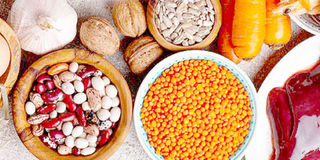Anaemic? Here are the foods you should be eating

Anaemic? Here are the foods you should be eating
If you are anaemic, you will already know that late nights or working too hard are not always to blame for your constant tiredness. However, making a few additions to your shopping basket could potentially reduce your anaemia symptoms.
A person becomes anaemic if the body does not have enough red blood cells and is mainly caused by excess blood loss and according to Dr Pius Mwanja, a general practitioner at Lifelink Medical Centre, there are several types of anaemia depending on the cause but the commonest is caused by an iron deficiency. A lack of folate and vitamin B 12 can also hinder the body’s ability to make red blood cells.
“Without iron, the red blood cells become low in haemoglobin which carries oxygen from the lungs to the rest of the body. Iron deficiency can be diagnosed by doing a blood count and the normal haemoglobin levels according to Dr Mwanja is supposed to range between 11 to 17g/cc.”
Risk factors
The major cause of anaemia is an iron deficiency and women and children bear the highest risk of becoming anaemic according to Dr Cohen Maliro, a clinical medical officer at Grand Medical Centre, Kira. He adds that this is especially when they experience heavy menstrual bleeding which destabilises the haemoglobin levels.
Pregnant women are also at risk of becoming anaemic since the body needs to produce more blood to support both the mother and the unborn baby.
“Over bleeding in case of an accident, gunshot, surgery or during childbirth can result in loss of a lot of haemoglobin; infections such as malaria can also cause anaemia. Heavy consumption of alcohol is often associated with poor nutrition which damages the kidney, liver and stomach thereby causing anaemia in the long run,” says Dr Maliro.
When a person is anaemic, they are likely to present with symptoms such as shortness of breath, dizziness, fatigue, lack of concentration and coordination, frequent blackouts or fainting because the brain does not get a sufficient supply of oxygen.
When you see such symptoms, Dr Maliro advises that you seek medical help as soon as possible or else one may suffer adverse complications
Treatment
Each person that suffers anaemia needs an individualized type of treatment depending on the cause and the level of severity. Mild anaemia can be treated with feeding options such as incorporating iron foods into your diet. It is important to remember that you cannot achieve the iron requirement from a single meal.
“Vegetables such as kale, spinach, red and green amaranth contain folate and are therefore essential sources of iron. One can also boil avocado leaves and seeds, beetroot and hibiscus. Dr Mwanja advises that one first alerts their doctor when they are planning to start taking hibiscus because it lowers blood pressure,” he warns.
Organ meats
Organ meats such as liver, poultry and red meat are good sources of folate and iron. Vegetarians can make use of foods like dry beans, soybeans, peas, pumpkin seeds, sunflower seeds, cashews and nuts.
Consuming vitamin C rich fruits and vegetables also helps in the absorption of iron; Oranges, strawberries, mangoes are helpful in the absorption of iron. Also, foods rich in folate and vitamin B 12 are helpful in the formation of red blood cells.
In the cases where one has severe anaemia, one can be transfused with whole blood or blood components that may have been lost after an assessment from the full blood count.
Dr Mwanja also recommends that “Folic acid and other iron supplements may also be prescribed for a specified period of time to boost the production of red blood cells in the body. It is important to note that not one type of food will help to cure and treat the anaemia but an overall healthy the diet will be helpful,” he says.




